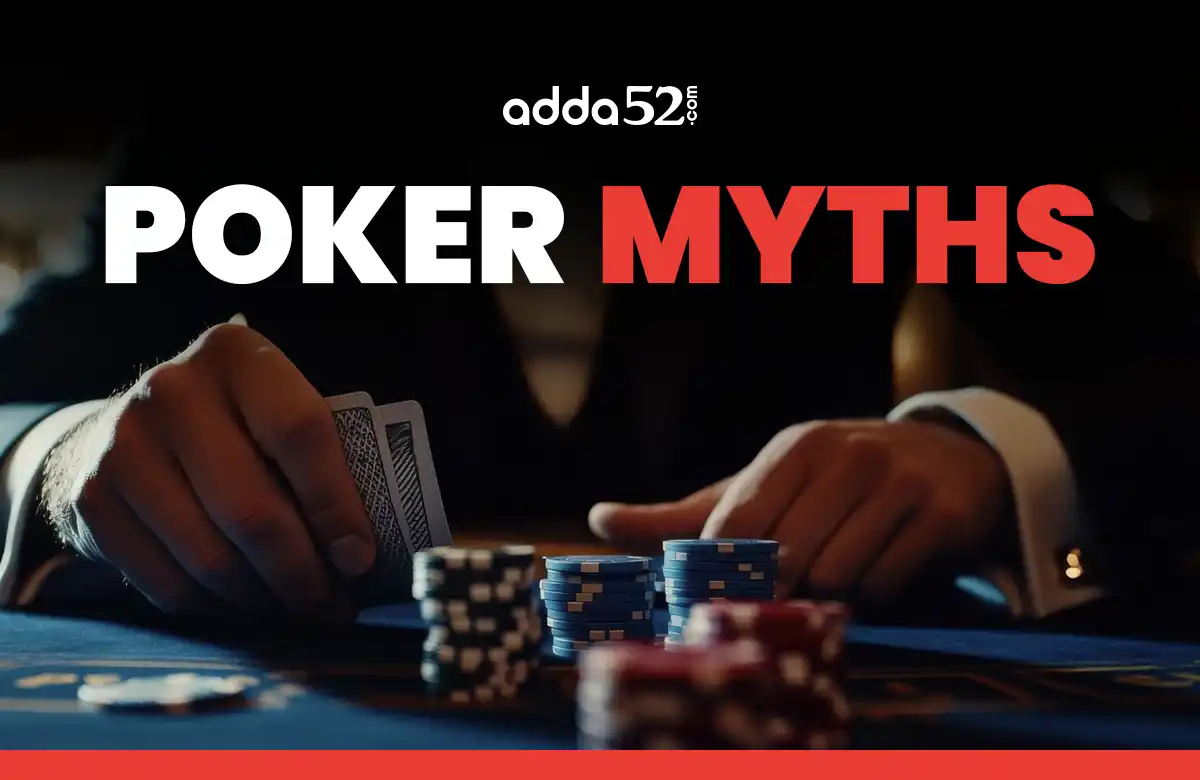
Introduction
Poker, with its origins tracing back to early 19th-century America, has captivated players with its blend of skill and strategy. As the game evolved from offline gaming rooms to online platforms, so too did the stories and legends surrounding it.
Like any popular activity, poker has its fair share of myths and misconceptions that can mislead beginners and seasoned players.
Let's explore some of the most common poker myths and uncover the truths behind them.
-
Myth #1: Poker is purely a game of luck.
Truth: While luck may influence short-term results, a game's ultimate outcome is predominantly determined by skill. Players with experience and expertise excel over novices through their remarkable ability to make strategic decisions, adeptly forecast the moves of fellow players, and manage finances effectively for long-standing equilibrium.
-
Myth #2: You need a poker face to win.
Truth: Bluffing is not a mandatory aspect of poker. It simply serves as one strategy that can aid in achieving success. Other tactics include hand reading, awareness of positioning, value betting, and timely bluffs that could prove highly beneficial. Nevertheless, those individuals who excessively rely on bluffs without understanding their opponents' inclinations or the strength of their respective hands may suffer from expensive mistakes instead.
-
Myth #3: Bluffing is essential to win at poker.
Truth: Rather than a requirement, bluffing serves as one tactic among many for successful poker players. Among these strategies are hand reading, positional awareness, and value betting, in addition to the occasional well-timed bluffs, which can be particularly effective. However, those who rely too heavily on bluffing without adequate knowledge of opponent tendencies or hand strength may find themselves making costly errors instead.
-
Myth #4: Good poker players are always aggressive.
Truth: Successful poker players know that balance is critical, despite aggression being a significant element of their strategy. They understand the importance of selectively unleashing their aggressiveness based on the situation and competitors they face. Being too aggressive can expose weaknesses that observant opponents exploit, whereas combining tactics cautiously enables these players to adapt skilfully in different game environments
-
Myth #5: Poker is addictive and harmful.
Truth: Like any game involving competition, poker can become addictive for some individuals. However, responsible players approach the game with discipline, limiting the time and money spent playing. Many professional players maintain balanced lives, combining poker with other interests and responsibilities.
-
Myth #6: Online poker is rigged.
Truth: To ensure fairness, reputable online poker platforms implement strict regulations and use random number generators (RNGs). Despite past reports of cheating and fraud cases, leading websites tirelessly invest in security measures for their players' safety while upholding a credible image. Site audits alongside player reviews and regulatory supervision aid these efforts to establish an open and secure environment conducive to gaming.
-
Myth #7: You need a large bankroll to play poker.
Truth: Though having an adequate bankroll to endure unpredictability is vital, poker welcomes players from various financial backgrounds. Several successful players began with low-risk bets and progressively grew their finances through skilful gameplay and careful management of their funds. Efficiently handling a bankroll necessitates comprehending risk versus reward as well as appropriate game choices.
-
Myth #8: Poker is a game for men only.
Truth: The poker community was once largely dominated by men, but it has now become more inclusive and diverse. Women have made remarkable progress in the game, succeeding in online and offline tournaments. The poker industry is open to players of all genders, irrespective of their backgrounds, while various organizations actively pursue equal representation across the board of diversity within this community.
-
Myth #9: You cannot develop reads on opponents in online poker.
Truth: Building reads and understanding opponents’ gameplay is integral to success in online poker. Players can observe betting patterns, timing tells, and gameplay decisions over time to develop insights into their opponents' strategies. Utilizing tracking software and note-taking tools further enhances the ability to gather and analyze information effectively.
-
Myth #10: Online poker is illegal or unregulated.
Truth: Online poker operates under varying regulations depending on the jurisdiction. Several countries have authorized and monitored online poker, guaranteeing player safety measures and equitable gaming criteria. To ensure they are engaging with trustworthy platforms, players must confirm the legality as well as licensing status of internet-based poker sites in their region.
-
Myth #11: Online poker is just a game of clicking buttons.
Truth: Effective online and live poker play requires mastery of essential skills such as strategy, psychology, and mathematical proficiency despite the mechanical nature of clicking buttons during virtual games. Skillful players must consider various factors, including hand strength, position on the table, and their opponents' playing styles, to make informed decisions. They also utilize risk management principles and game theory to attain optimal play outcomes.
Frequently Asked Questions
Is online poker rigged?
No, reputable online poker sites use sophisticated random number generators (RNGs) and are regularly audited for fairness. Rigging would undermine their reputation and legality. Variance and losing streaks can occur due to the nature of probability, but over time, outcomes tend to reflect the statistical probabilities of the game.
Do poker players have extraordinary mathematical abilities?
Although some players may possess exceptional mathematical abilities, mastering advanced math is not mandatory for triumph. While it is certainly imperative to have a firm grasp on basic concepts of probability and odds calculation, accomplished players also rely heavily on psychological tactics such as assessing opponents and skillfully strategizing based on factors that extend beyond merely numerical calculations
Can you learn poker from books or online resources?
Books and online resources provide valuable knowledge, but practical experience and gameplay are essential for mastering poker. Applying theoretical knowledge in real games, adjusting strategies based on actual opponents, and learning from mistakes is crucial for developing skills and becoming a proficient player.
Are poker tournaments only for elite players?
Poker tournaments are open to players with different levels of expertise. They present a chance for new and experienced participants to engage in healthy competition while honing their skills. A wide range of buy-ins and formats is available, ensuring accessibility based on skill level as well as affordability—from regional matches to high-profile global championships.
Conclusion
Players worldwide remain fascinated by poker's combination of skill, strategy, and psychology. By debunking common misconceptions, enthusiastic players can better comprehend what it takes to succeed in this classic card game.
